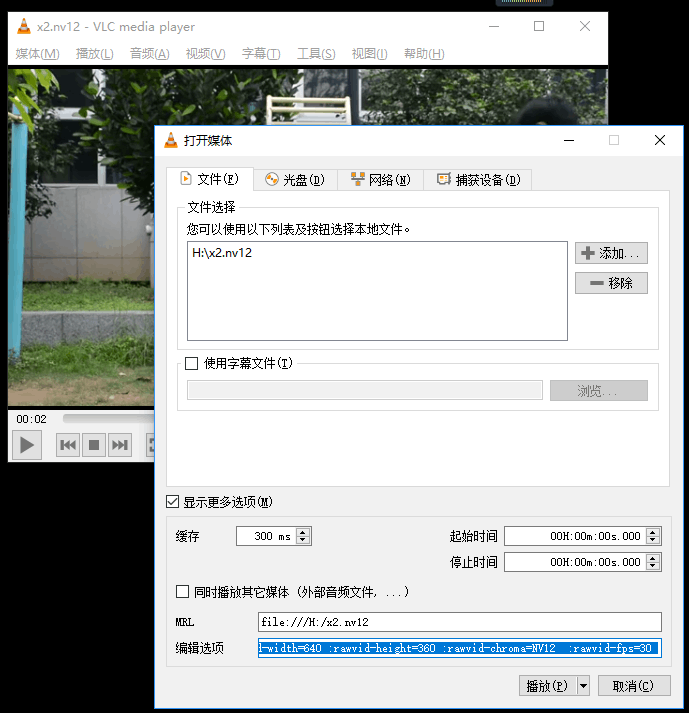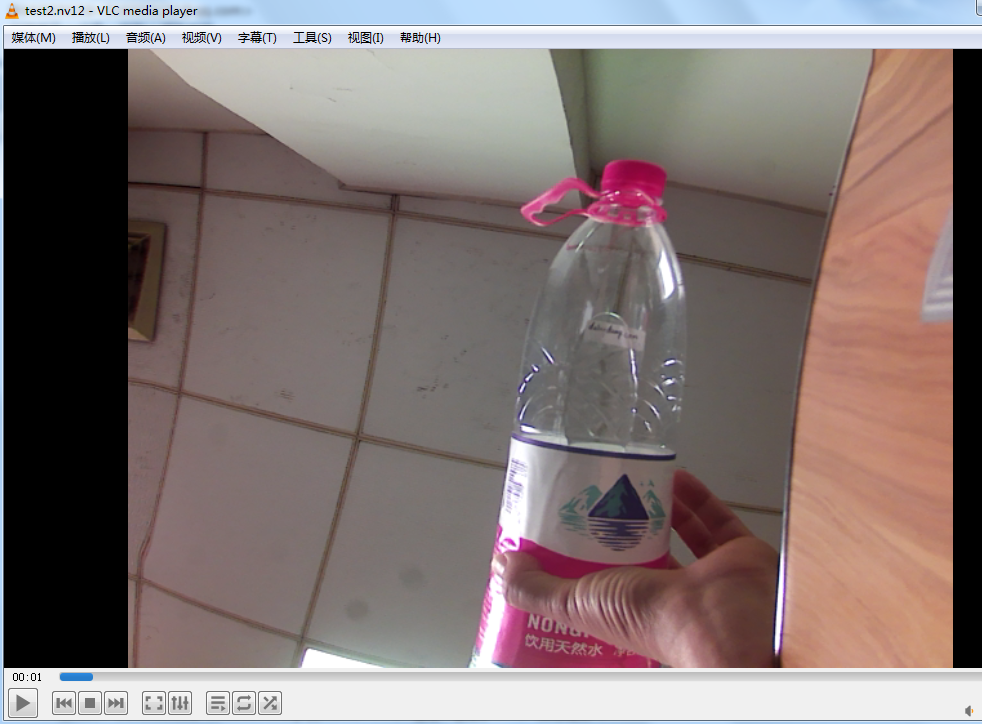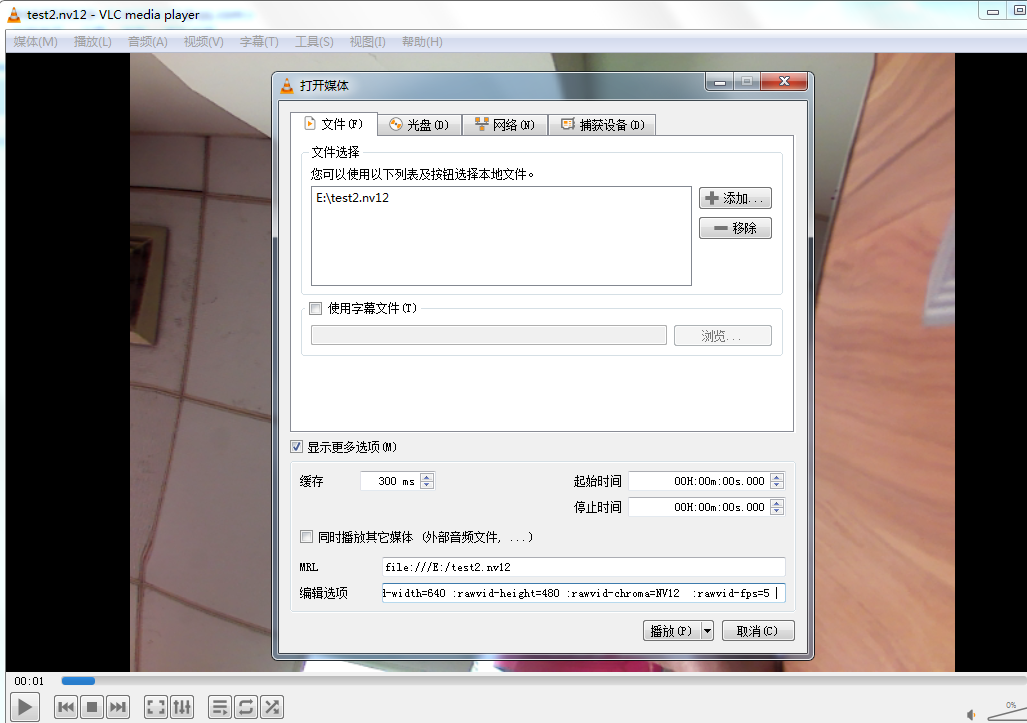楼主 #1 2018-04-05 18:26:37 分享评论
- 晕哥
- 管理员
- 所在地: wechat: whycan_cn
- 注册时间: 2017-09-06
- 已发帖子: 9,433
- 积分: 9202
把mp4格式的h.264视频文件解码成NV12格式, 并使用VLC播放 / V3s 摄像头录制成NV12原始数据
参考链接1: 把mp4格式的h.264视频文件解码成NV12格式, 并使用VLC播放 / V3s 摄像头录制成NV12原始数据
参考链接2: 把NV12格式的视频原始数据, 传送给V3s的编解码器,让其输出h.264码流
1. ubuntu 安装 视频编解码工具 avconv:
sudo apt-get install libav-tools
windows下载 vlc-3.0.1-win32.exe 并安装.
2. 使用avconv工具把 mp4格式的h.264视频文件解码成NV12格式:
avconv -i demp.mp4 -vf pad="trunc((iw+31)/32)*32" -vf pad="trunc((iw+31)/32)*32" -pix_fmt nv12 -f rawvideo demo.nv12
demo.mp4 是输入文件
demo.nv12 是输出文件
nv12是输出格式
3.使用vlc打开nv12文件:

点击 【文件】 -> 【打开多个文件】-> 【添加】第二步生成的demo.nv12 文件
编辑选项填写好格式即可播放。
:demux=rawvideo :rawvid-width=640 :rawvid-height=480 :rawvid-chroma=NV12 :rawvid-fps=5
离线
楼主 #2 2018-04-05 18:42:51 分享评论
楼主 #5 2020-12-19 19:28:55 分享评论
- 晕哥
- 管理员
- 所在地: wechat: whycan_cn
- 注册时间: 2017-09-06
- 已发帖子: 9,433
- 积分: 9202
Re: 把mp4格式的h.264视频文件解码成NV12格式, 并使用VLC播放 / V3s 摄像头录制成NV12原始数据
linux3.4 bsp linux 摄像头NV12格式原始视频格式数据采集源码:
#include <stdio.h>
#include <stdlib.h>
#include <string.h>
#include <assert.h>
#include <getopt.h>
#include <fcntl.h>
#include <unistd.h>
#include <errno.h>
#include <malloc.h>
#include <sys/stat.h>
#include <sys/types.h>
#include <sys/time.h>
#include <sys/mman.h>
#include <sys/ioctl.h>
#include <asm/types.h>
#include <linux/videodev2.h>
#define BUF_NUM 4
#define FRAMESINBUF 1
struct CJ_Buffer {
void *memory;
int length;
};
struct CJ_Buffer *gpV4l2Buf;
int gMemMapLen;
int file_fd;
char *dev_name = "/dev/video0";
int fd;
int getFullSize(int * full_w, int * full_h)
{
struct v4l2_frmsizeenum size_enum;
size_enum.type = V4L2_BUF_TYPE_VIDEO_CAPTURE;
size_enum.pixel_format = V4L2_PIX_FMT_NV12;
size_enum.index = 0;
if (-1 == ioctl(fd, VIDIOC_ENUM_FRAMESIZES, &size_enum))
{
perror("VIDIOC_ENUM_FRAMESIZES failed");
return 0;
}
*full_w = size_enum.discrete.width;
*full_h = size_enum.discrete.height;
printf("getFullSize: %dx%d\n", *full_w, *full_h);
return 1;
}
int tryFmtSize(int *width, int *height)
{
int ret = -1;
struct v4l2_format fmt;
printf("%dx%d", *width, *height);
memset(&fmt, 0, sizeof(fmt));
fmt.type = V4L2_BUF_TYPE_VIDEO_CAPTURE;
fmt.fmt.pix.width = *width;
fmt.fmt.pix.height = *height;
//fmt.fmt.pix.pixelformat = V4L2_PIX_FMT_YUYV;
//fmt.fmt.pix.pixelformat = V4L2_PIX_FMT_MJPEG;
//fmt.fmt.pix.pixelformat = V4L2_PIX_FMT_H264;
fmt.fmt.pix.pixelformat = V4L2_PIX_FMT_NV12;
fmt.fmt.pix.field = V4L2_FIELD_NONE;
ret = ioctl(fd, VIDIOC_TRY_FMT, &fmt);
if (ret < 0)
{
perror("VIDIOC_TRY_FMT failed");
return ret;
}
// driver surpport this size
*width = fmt.fmt.pix.width;
*height = fmt.fmt.pix.height;
return 0;
}
int setContrastValue(int value)
{
int ret = -1;
struct v4l2_control ctrl;
ctrl.id = V4L2_CID_CONTRAST;
ctrl.value = value;
ret = ioctl(fd, VIDIOC_S_CTRL, &ctrl);
if (ret < 0) {
perror("VIDIOC_S_CTRL failed");
} else {
printf("setContrastValue ok\n");
}
return ret;
}
int setBrightnessValue(int value)
{
struct v4l2_control ctrl;
int ret = -1;
ctrl.id = V4L2_CID_BRIGHTNESS;
ctrl.value = value;
ret = ioctl(fd, VIDIOC_S_CTRL, &ctrl);
if (ret < 0) {
perror("VIDIOC_S_CTRL failed");
} else {
printf("setBrightnessValue ok\n");
}
return ret;
}
int setSaturationValue(int value)
{
struct v4l2_control ctrl;
int ret = -1;
ctrl.id = V4L2_CID_SATURATION;
ctrl.value = value;
ret = ioctl(fd, VIDIOC_S_CTRL, &ctrl);
if (ret < 0) {
perror("VIDIOC_S_CTRL failed");
} else {
printf("setSaturationValue ok\n");
}
return ret;
}
int setSharpnessValue(int value)
{
struct v4l2_control ctrl;
int ret = -1;
ctrl.id = V4L2_CID_SHARPNESS;
ctrl.value = value;
ret = ioctl(fd, VIDIOC_S_CTRL, &ctrl);
if (ret < 0) {
perror("VIDIOC_S_CTRL failed");
} else {
printf("setSharpnessValue ok\n");
}
return ret;
}
int setHueValue(int value)
{
struct v4l2_control ctrl;
int ret = -1;
ctrl.id = V4L2_CID_HUE;
ctrl.value = value;
ret = ioctl(fd, VIDIOC_S_CTRL, &ctrl);
if (ret < 0) {
perror("VIDIOC_S_CTRL failed");
} else {
printf("setHueValue ok\n");
}
return ret;
}
int setHflip(int value)
{
struct v4l2_control ctrl;
int ret = -1;
ctrl.id = V4L2_CID_HFLIP_THUMB;
ctrl.value = value;
printf("V4L2CameraDevice::setHflip value=%d\n", value);
ret = ioctl(fd, VIDIOC_S_CTRL, &ctrl);
if (ret < 0)
{
//setSharpnessValue failed
perror("setHflip thumb failed\n");
}
ctrl.id = V4L2_CID_HFLIP;
ctrl.value = value;
printf("V4L2CameraDevice::setHflip value=%d\n", value);
ret = ioctl(fd, VIDIOC_S_CTRL, &ctrl);
if (ret < 0)
{
//setSharpnessValue failed
perror("setHflip failed\n");
}
return ret;
}
int setVflip(int value)
{
struct v4l2_control ctrl;
int ret = -1;
ctrl.id = V4L2_CID_VFLIP_THUMB;
ctrl.value = value;
printf("V4L2CameraDevice::setVflip value=%d\n", value);
ret = ioctl(fd, VIDIOC_S_CTRL, &ctrl);
if (ret < 0)
{
//setSharpnessValue failed
perror("setVflip thumb failed111\n");
}
ctrl.id = V4L2_CID_VFLIP;
ctrl.value = value;
printf("V4L2CameraDevice::setVflip value=%d\n", value);
ret = ioctl(fd, VIDIOC_S_CTRL, &ctrl);
if (ret < 0)
{
//setSharpnessValue failed
perror("setVflip failed111\n");
}
return ret;
}
int v4l2setCaptureParams(int framerate)
{
printf("framerate=%d", framerate);
int ret = -1;
struct v4l2_streamparm params;
params.parm.capture.timeperframe.numerator = 1;
params.parm.capture.timeperframe.denominator = framerate;
params.type = V4L2_BUF_TYPE_VIDEO_CAPTURE;
params.parm.capture.capturemode = V4L2_MODE_VIDEO;
printf("VIDIOC_S_PARM mFrameRate: %d, capture mode: %d\n", framerate, params.parm.capture.capturemode);
ret = ioctl(fd, VIDIOC_S_PARM, ¶ms);
if (ret < 0) {
perror("VIDIOC_S_PARM failed");
} else {
printf("v4l2setCaptureParams ok\n");
}
return ret;
}
void v4l2SetVideoParams(int width, int height, int sub_w, int sub_h, unsigned int pix_fmt)
{
struct v4l2_format format;
printf("main:%dx%d, sub:%dx%d, pfmt: 0x%x\n", width, height, sub_w, sub_h, pix_fmt);
memset(&format, 0, sizeof(format));
format.type = V4L2_BUF_TYPE_VIDEO_CAPTURE;
format.fmt.pix.width = width;
format.fmt.pix.height = height;
//format.fmt.pix.pixelformat = V4L2_PIX_FMT_YUYV;
//format.fmt.pix.pixelformat = V4L2_PIX_FMT_MJPEG;
//format.fmt.pix.pixelformat = V4L2_PIX_FMT_H264;
format.fmt.pix.pixelformat = V4L2_PIX_FMT_NV12;
format.fmt.pix.field = V4L2_FIELD_NONE;
if ((sub_w > 0 && sub_w < width) && (sub_h > 0 && sub_h < height)) {
struct v4l2_pix_format sub_fmt;
memset(&sub_fmt, 0, sizeof(sub_fmt));
format.fmt.pix.subchannel = &sub_fmt;
format.fmt.pix.subchannel->width = sub_w;
format.fmt.pix.subchannel->height = sub_h;
format.fmt.pix.subchannel->pixelformat = pix_fmt;
format.fmt.pix.subchannel->field = V4L2_FIELD_NONE;
format.fmt.pix.subchannel->rot_angle = 0;
printf("sub_w=%d, sub_h=%d\n", sub_w, sub_h);
}
if (ioctl(fd, VIDIOC_S_FMT, &format) < 0)
{
perror("VIDIOC_S_FMT failed");
return;
}
return;
}
void initV4l2Buffer()
{
gpV4l2Buf = (struct CJ_Buffer *)malloc(sizeof(struct CJ_Buffer) * BUF_NUM);
if (gpV4l2Buf == NULL) {
perror("alloc V4l2Buffer_tag error!!");
return;
}
memset(gpV4l2Buf, 0, sizeof(struct CJ_Buffer) * BUF_NUM);
}
void setFramesInV4L2BufNum()
{
unsigned int nFramesInBuf = FRAMESINBUF;
printf("mFramesInV4l2buf=%u\n", FRAMESINBUF);
if (ioctl (fd, VIDIOC_SET_NFRAME_BUF, &nFramesInBuf) < 0) {
perror("VIDIOC_SET_NFRAME_BUF failed");
}
}
int v4l2ReqBufs(int * buf_cnt)
{
int ret = 0;
struct v4l2_requestbuffers rb;
printf("TO VIDIOC_REQBUFS count: %d\n", *buf_cnt);
memset(&rb, 0, sizeof(rb));
rb.type = V4L2_BUF_TYPE_VIDEO_CAPTURE;
rb.memory = V4L2_MEMORY_MMAP;
rb.count = *buf_cnt;
ret = ioctl(fd, VIDIOC_REQBUFS, &rb);
if (ret < 0)
{
perror("VIDIOC_REQBUFS failed");
return ret;
}
*buf_cnt = rb.count;
printf("VIDIOC_REQBUFS count: %d\n", *buf_cnt);
return 1;
}
int v4l2QueryBuf()
{
int i;
int ret = 0;
struct v4l2_buffer buf;
for (i = 0; i < BUF_NUM; i++)
{
memset (&buf, 0, sizeof (struct v4l2_buffer));
buf.type = V4L2_BUF_TYPE_VIDEO_CAPTURE;
buf.memory = V4L2_MEMORY_MMAP;
buf.index = i;
ret = ioctl (fd, VIDIOC_QUERYBUF, &buf);
if (ret < 0)
{
perror("VIDIOC_QUERYBUF failed");
return ret;
}
gpV4l2Buf[i].memory = mmap(0, buf.length,
PROT_READ | PROT_WRITE,
MAP_SHARED,
fd,
buf.m.offset);
gMemMapLen = buf.length;
printf("index: %d, mem: %x, len: %d, offset: %x\n", i, (int)gpV4l2Buf[i].memory, buf.length, buf.m.offset);
if (gpV4l2Buf[i].memory == MAP_FAILED)
{
perror("mmap failed");
return -1;
}
}
for (i = 0; i < BUF_NUM; i++)
{
memset (&buf, 0, sizeof (struct v4l2_buffer));
buf.type = V4L2_BUF_TYPE_VIDEO_CAPTURE;
buf.memory = V4L2_MEMORY_MMAP;
buf.index = i;
// start with all buffers in queue
ret = ioctl(fd, VIDIOC_QBUF, &buf);
if (ret < 0)
{
perror("VIDIOC_QBUF failed");
return ret;
}
}
return 1;
}
int v4l2StartStreaming()
{
int ret = 0;
enum v4l2_buf_type type = V4L2_BUF_TYPE_VIDEO_CAPTURE;
ret = ioctl (fd, VIDIOC_STREAMON, &type);
if (ret < 0)
{
perror("VIDIOC_STREAMON failed");
return ret;
}
return 1;
}
int v4l2StopStreaming()
{
int ret = 0;
enum v4l2_buf_type type = V4L2_BUF_TYPE_VIDEO_CAPTURE;
ret = ioctl (fd, VIDIOC_STREAMOFF, &type);
if (ret < 0)
{
perror("VIDIOC_STREAMOFF failed");
return ret;
}
printf("V4L2Camera::v4l2StopStreaming ok\n");
return 1;
}
int v4l2UnmapBuf()
{
int i;
int ret = 0;
for (i = 0; i < BUF_NUM; i++)
{
ret = munmap(gpV4l2Buf[i].memory, gMemMapLen);
if (ret < 0)
{
perror("munmap failed");
return ret;
}
gpV4l2Buf[i].memory = NULL;
}
return 1;
}
int main (int argc,char ** argv)
{
struct v4l2_capability cap;
struct v4l2_format fmt;
struct v4l2_pix_format sub_fmt;
struct v4l2_requestbuffers req;
struct v4l2_buffer buf;
struct v4l2_input inp;
unsigned int i;
enum v4l2_buf_type type;
int width, height;
fd = open(dev_name, O_RDWR | O_NONBLOCK, 0);
ioctl (fd, VIDIOC_QUERYCAP, &cap);
printf("Driver Name:%s\n Card Name:%s\n Bus info:%s\n\n", cap.driver, cap.card, cap.bus_info);
printf("capabilities:%d\n", cap.capabilities);
if ((cap.capabilities & V4L2_CAP_VIDEO_CAPTURE) == 0 &&
(cap.capabilities & V4L2_CAP_STREAMING) == 0)
{
perror("cap capabilities format fail");
return -2 ;
}
inp.index = 0;
if (-1 == ioctl(fd, VIDIOC_S_INPUT, &inp))
{
perror("VIDIOC_S_INPUT error!");
return -2 ;
}
getFullSize(&width, &height);
width = 640; height = 480;
/*tryFmtSize(&width, &height);
setContrastValue(50);
setBrightnessValue(50);
setSaturationValue(0);
setSharpnessValue(10);
setHueValue(30);
setHflip(0);
setVflip(0);*/
v4l2setCaptureParams(30);
v4l2SetVideoParams(640, 480, 320, 240, V4L2_PIX_FMT_NV12);
initV4l2Buffer();
setFramesInV4L2BufNum();
int buf_cnt = BUF_NUM;
v4l2ReqBufs(&buf_cnt);
v4l2QueryBuf();
v4l2StartStreaming();
//for (i = 0; i < 10; i++)
// sleep(1);
//struct v4l2_control ctrl;
// ctrl.id = V4L2_CID_TAKE_PICTURE;
//if (ioctl(fd, VIDIOC_S_CTRL, &ctrl) < 0) {
// perror("VIDIOC_S_CTRL failed");
// } else {
// perror("setTakePictureCtrl ok\n");
// }
FILE* fp = fopen("test2.nv12", "w");
if(fp == NULL)
{
printf("open file error.\n");
goto end;
}
for (i = 0; i < 200; i++)
{
fd_set fds;
FD_ZERO(&fds);
FD_SET(fd, &fds);
select(fd + 1, &fds, NULL, NULL, NULL);
memset(&buf, 0, sizeof(struct v4l2_buffer));
buf.type = V4L2_BUF_TYPE_VIDEO_CAPTURE;
buf.memory = V4L2_MEMORY_MMAP;
ioctl(fd, VIDIOC_DQBUF, &buf);
void *pMem = gpV4l2Buf[buf.index].memory;
printf("frame addr = %x, length=%d, %d\n", (unsigned int)pMem, gpV4l2Buf[buf.index].length, buf.length);
fwrite(pMem, 640 * 480 * 3 / 2, 1, fp);
#if 0
if (i == 199)
{
file_fd = open("test.jpg", O_RDWR | O_CREAT, 0777);
write(file_fd, pMem, 640 * 480 * 3 / 2);
close (file_fd);
printf("frame index = %d, size = %d.\n", buf.index, buf.length);
}
#endif
ioctl(fd, VIDIOC_QBUF, &buf);
}
end:
fclose(fp);
v4l2StopStreaming();
v4l2UnmapBuf();
close (fd);
printf("Camera Done.\n");
return 0;
}

NV12录像文件下载: nv12_data.7z
离线
感谢为中文互联网持续输出优质内容的各位老铁们。
QQ: 516333132, 微信(wechat): whycan_cn (哇酷网/挖坑网/填坑网) service@whycan.cn
太原小智科技有限责任公司 - 东莞哇酷科技有限公司联合开发
太原小智科技有限责任公司 - 东莞哇酷科技有限公司联合开发